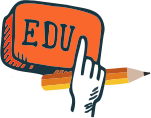
Numerous profitable instructor enhancement tasks provide proof of the benefits of ongoing collaboration amongst a number of K-12 lecturers and scientists. The Science and Health Education Partnership of the University of California-San Francisco (UCSF), for instance, has actively partnered with the San Francisco Unified School District since 1987. In Atlanta, Georgia, a number of local schools and universities are collaborating on a program to position undergraduate science students in semester-long partnerships with local elementary faculty teachers.
Curriculum: Mathematics and Science Education, Interdisciplinary Science Education
Our secondary program in Science Education offers prospective lecturers a variety of opportunities to look at the connections between educating and learning science, middle and highschool youth, and issues of instructional coverage and practice. As the twenty-first century emerges, many nations around the globe are arguing for the merger of science and know-how in K–12 colleges. Further, such programs are hardly ever elements of collegiate applications for getting ready new teachers. Few see the ties between science and expertise, whereas they usually see ties between science and mathematics. Karen F. Zuga, writing in the 1996 guide Science/Technology/Society as Reform in Science Education, outlined the explanations and rationale for and the problems with such a rejoining of science and know-how.
Learn More About Science Education in These Related Titles
Ideally, instructing the scientific method to students is teaching them how to suppose, study, solve problems and make knowledgeable selections. These abilities are integral to each side of a student’s schooling and life, from faculty to profession. The examples listed here represent only a tiny fraction of ongoing partnerships nationwide that contain scientists from both educational and private organizations. Regardless of their dimension or specific aims, all profitable packages are characterised by an atmosphere of mutual respect and real appreciation of the roles played by every participant.
Through the Elementary Science Education Partners challenge, headquartered at Emory University, college students are recruited and educated to serve as ”œscience companions,” bringing their experience and enthusiasm for science to innercity lecture rooms. The program is supported by a district-broad LSC grant from NSF, and it coordinates its activities with the Atlanta Urban Systemic Initiative (NSF 1997a).
The National Board for Professional Teaching Standards (NBPTS) has created a comprehensive assessment course of leading to National Board Certification in science, amongst other topic areas, for practicing academics. Currently, certification is available just for academics at the high-faculty level (students 14–18+ years old). Certification guidelines in science are underneath improvement for those who teach youngsters of ages 7–15 years. National board-licensed teachers show high levels of information and skills as evidenced by way of a two-part evaluation process that includes improvement of a portfolio at the instructor’s college and an analysis at a centralized location (NBPTS 1999). The National Science Teachers Association (NSTA) has also created a plan for a science Teacher Certification Program, which presently is being reviewed.
Some states and local districts are adjusting or rewriting their tips for science education to make them more consistent with the suggestions of one or both of those national tasks. In addition, many progressive curriculum growth teams have created, or are within the process of making, educational packages that help college students and academics meet the NRC Standards by specializing in approaches that develop college students’ problem-fixing and critical-pondering abilities. These approaches, which are significantly related to ”œhow” college students ought to study science, embrace inquiry, cooperative studying, questioning strategies, much less-is-extra, and real-world relevance.
”œGTAs at many universities aren’t provided any coaching in academic theories or methods,” Lampley says. ”œFor the biological sciences, that is regarding since such a high volume of laboratory courses are taught by GTAs.” Lampley, passionate about biology training, chose the doctoral program to increase her content material data and research new research about how college students study. ”œAlthough my college students have been making the mandatory features according to the required yearly standardized exams, I felt like there was more I might be doing to make their learning experiences more priceless, participating, and relevant to their lives,” she says. Other dissertation writing fellowships for went to Jeff Bonner (active studying strategies in microbiology) and Teresa Schmidt (growth of sixth-graders’ spatial visualization expertise).
Ongoing efforts to change the way science is taught in colleges focus on all aspects of the educational system. Teachers also needs to have opportunities to experience new palms-on instructing packages, but such in-service alternatives–which optimally should be a number of days or even weeks in duration, with observe-up for a minimum of one faculty year–usually are not all the time available, for the reasons already described.
However, at the identical time a brand new vision of science training for K-12 students has emerged. Sandy Lampley, a middle and highschool science instructor for 11 years, received one of the provost’s annual dissertation writing fellowships earlier than incomes her Ph.D. in August 2015. Her dissertation examined the potential that lesson research, a form of skilled development profitable in Japan’s K-12 schooling, holds for advancing graduate teaching assistants’ pedagogical content material information while teaching an introductory biology course.

